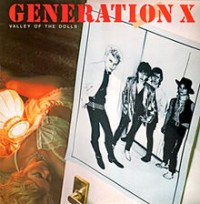
Generation X
Valley of the Dolls (1979)
Chris DC
Potential can be a strange dynamic when it comes to music. The majority of bands that are formed have none, and they disappear before even naming themselves. For the bands that do have it, the questions of how much potential there is and how to nurture it come into play. Then of course annoying variables like luck and public reception have their input as well. Some bands are selling out arenas off of their debut album; others put out their masterpiece 25 years into their career.
And then there are bands like Generation X. They had an incredibly strong debut album in their self-titled 1978 release. But the pressures of living up to their potential on the follow-up, 1979’s Valley of the Dolls, proved futile even beyond the usual sophomore slump, and in fact led to the early demise of the band later in the year.
Despite the panning from critics and the poor commercial performance, it absolutely would not be fair to call Valley of the Dolls a bad album. Given, it’s not as enjoyable as the previous one. Given, it lacks any true radio tracks that everyone involved was hoping for. But to dismiss it completely would be a disservice.
Admittedly there is a lot going on here as far as ideas. Different band members came in with all different styles they wanted for the record, and rather than focus on one or two, everything was just put into a blender and committed to tape.
There’s the more dance oriented punk that singer Billy Idol felt would be the way back to the charts (“Running With the Boss Sound”, “Friday’s Angels”), along with more traditional garage punk (“Night of the Cadillacs”, “Gimme Some Truth”, the title track), and treks into what would soon become new wave (“Paradise West”, “English Dream”). All being done by a band whose talent could go equals to equals with nearly any other British punk band of the time. There really aren’t any songs here that, as parts and not a sum, should’ve been left on the cutting room floor.
More to that point; while it was a mitigating factor, Valley of the Dolls in and of itself did not kill off Generation X. The album does reflect the artistic differences, but there was also management issues, problematic substance use, and Idols’s desire to go solo.
Perhaps its a ‘sign of the times’ thing, but this reviewer is confident that had Valley of the Dolls been released in recent years, it would’ve been applauded as eclectic, well rounded, and a bit experimental.